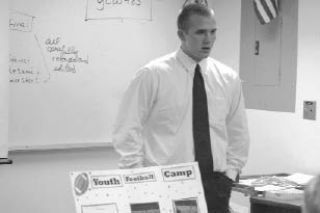LANGLEY — Standing in front of a bunch of adults to give a presentation can be a daunting task for just about anyone.
And if you’re a high school student, and the adults are grading your performance with graduation on the line, the experience can be downright nerve-wracking.
Nevertheless, 141 South Whidbey High School seniors went through the first-ever senior culminating project presentations last week and, by all accounts, succeeded.
A requirement for graduation beginning with this year’s class, the culminating project requires students to use their ingenuity, knowledge, skills and creativity to master a subject of interest.
Each student has to submit a research paper, then make a presentation to a community board using effective speaking skills that show depth of knowledge.
The concept benefits kids in the short term — they graduate — and in the long term it will prepare them for life in the real world, whether that means college, a job, homemaking or military service, said counselor Dennis Hunter.
For months, organizer John Long had visited church and civic groups to find volunteers.
Long said the school district has begun a volunteer database it can tap for future programs. He added that there is talk of having several of the more outstanding students give their talks to the community.
Principal Rob Prosch admitted he was a little nervous himself as he explained the process.
“This is the first time for them and for us,” he said. “These seniors have done a great deal of work and we appreciate their, and your, participation.”
Seniors were to be graded, not on content, but on their performance. The speech as a whole, eye contact, delivery, visual aids, what the student learned, organization and the ability to effectively answer questions were all on the line. The final score meant a senior either met, exceeded or did not meet expectations.
“It could turn out the student’s project was a failure in some way,” Prosch said. “Perhaps the senior wanted to learn welding, burned himself and decided not to be a welder for the rest of his life. That’s OK because failure and what the student learns is part of the educational process.
“The experience of standing before you tonight is a skill that will serve them well the rest of their lives,” Prosch noted.
The variety of projects covered a wide spectrum.
One teen remodeled his family’s kitchen. Another knit or crocheted a large number of items, challenging herself to do better with each piece. Two others had organized a blood drive at a local bank.
Volunteer Camille Long was impressed.
“One young lady wants to study international relations so she planned a summer trip to Italy,” Long said. “She studied the country’s history, language and culture and did specific research into how much it would cost as well as several itineraries.”
Long said it was clear a lot of thought went into each project.
In another classroom, senior Nick Rovang discussed three short stories he had written.
“I think people underestimate the value of the short story,” he explained.
Rovang researched a writer’s methodology and studied concepts like irony, sarcasm and paradox. He also read about the careers of some famous short story authors.
“I found some who moved on to novels once they became established,” he said.
Rovang said he picked the subject because, though he had taken a creative writing class, it was still a stretch for him.
“I learned how to be a better writer and I’d like to share a story
I wrote with you tonight.”
Though Rovang used no visual aids, his story — a fantasy about a tarnished silver cup bought at a garage sale — brought a round of applause when he was through.
Annie Doran is considering a career as a translator so she studied French using a software program called the Rosetta Stone. She passed around a notebook filled with extensive and precise hand-written notes on words and phrases.
“I studied the history of the Romance languages as they evolved from the Latin,” she explained.
“While I enjoyed this project, in retrospect I should have chosen Italian but I admit there has been a lot of self-growth as a result of the research I did,” she said.
Darrin Britton combined two interests for his senior thesis — sports and teaching.
Last summer, he organized and ran a basic skills football day camp for 40 youngsters in the second- to sixth-grades. He set up four stations — wide receiver, linebacker, running back and quarterback — so each kid had a chance to see where he or she fit.
“I’m pretty sure I want to teach someday and I played football and wrestled as a Falcon, so this project made sense,” he said.
After being told by the evaluation team that his eye contact was outstanding and that they appreciated him wearing a shirt and tie, Britton admitted he was nervous.
“Don’t be fooled, all of us are sweating bullets tonight,” he said. “It went well but I’m sure glad it’s over.”



